
Yeah, I’m turning twenty, it’s terrifying by CJ Q. '23
one year of mit
One. Last Monday, I waited an hour to get tested. The testing trailers are right in front of Medical, and the line went in front of and around the Media Lab, across the street past East Campus, past the Green Building, past Hayden, all the way to Building 6. I thought living in East Campus meant being able to glance at the line outside my window and line up when it was short, but this wasn’t the case, because the line was that long all day. Maybe it’s because the tests of the five thousand or so people who got tested the previous week all expired on Monday.
The next day, the COVID Pass app got an update with the estimated wait.

Last Wednesday, the line is much shorter, more similar to what the lines were the weeks before this. I wait maybe three minutes. Then I get to the table, where they scan my ID, ask me for my last name, my date of birth, my phone number, confirm my address is still valid.
“Do you still live in 362 Memorial Drive?”
“Oh, no. I just moved. I live in 3 Ames Street now.”
“380 what?”
“3 Ames Street.”
The sticker printer next to her laptop prints out a sticker, which she pulls and rips in half. She types in my new address, takes the next printed sticker, puts it on a tube, and hands it to me with a plastic-wrapped swab.
I head into a testing trailer.
Two. One of the only things I remember from The Catcher in the Rye:
What really knocks me out is a book that, when you’re all done reading it, you wish the author that wrote it was a terrific friend of yours and you could call him up on the phone whenever you felt like it. That doesn’t happen much, though.
I’m not really a fan of reading fiction as much as I like to read blogs, and as you can imagine, I like reading people’s personal blogs. And you know that feeling when you’ve just read someone’s post, maybe from several years ago, and it just feels so closely relatable, somehow, that you can swear you could’ve written the same thing? Today, I got this feeling while reading Campus is quiet:
Nick is on the other side of the bed, by the window, and I mention to him and Brenda that I hadn’t been working on my UROP. I say this in a sort of half-jokingly-triumphant way because I had been uninterested in the project for a while, but felt sort of conflicted about whether or not I should do it anyway, because I don’t know… is quitting your summer UROP a thing? is a resume a thing I should care about? is there a good reason I should feel obligated to continue? to which I had settled on “probably not” for each. Brenda applauds this decision; Nick expresses a similar dispassion. Emilio suggests that it might be more interesting to do research than to do nothing, a comment I would think comes from a place of him being very interested in his own work. I know a lot of people who feel this way, but I don’t think I’m one of them yet.
Later in that post Michelle mentions being in East Campus that summer, and somehow that made me feel a little more connected. It reminded me of something I read, the other week, while going through the archives of the Filipino Student Association. I read the name of a member, who lived in the same room I lived in East Campus, lots and lots of years ago.
They were here, where I am right now, but the difference is that they were here in the past. It’s unfortunate, I guess, that distance isn’t only space, but also time. When I think about the thousands and thousands of people who’ve ever lived in East Campus, I think about how I’ll only get to know a tiny fraction, a mere sliver of them.
I feel small.
Three. I talked about my UROP two months ago, and I’m not sure how I feel about it. Half the time, I felt genuinely excited working on the project, and the code came out of my fingertips as smoothly as I talked. The other half, it felt like a slog going through the mess of code, and it felt like I was only working on the UROP because I was paid for it.
While I did feel like I learned things, like TypeScript or Postgres or Docker, or about designing APIs well and keeping code organized, it doesn’t feel… worth it. It didn’t feel like it was worth the three hundred forty hours. Admitting this makes me feel bad, because my supervisor is great, the lab is great, and the UROP I worked with is great too! But it just didn’t spark joy.
And I’ve always heard advice along the lines of
It’s okay to quit activities, especially as a fall-term frosh—this includes UROPs. Don’t be stuck working for a lab you don’t want to work for or where the work environment is toxic.
But whenever I thought about quitting, which maybe happened four or five this summer, there were always these doubts. What about all the effort I already put in? What about the project that I’d leave half-finished? Is it really just a bad fit, or is it just the depression?
Four. In the testing trailer is a person wearing a blue medical gown. I hand her the tube. She places it on a rack, and screws the tube open.
“Can you confirm your date of birth?”
I tell her my birthdate. And she replies:
“So it’s your birthday soon.”
“Yeah, I’m turning twenty, it’s terrifying.”
“Are you comfortable swabbing yourself?”
“Sure.”
I take off my mask, open the small plastic pack, and pull out the cotton swab. It’s the fourth time that I’m doing this, and at this point, it feels like second nature.
“I’ll count for you.”
I put the swab in my left nostril, push it against the walls, and roll it around for a couple seconds. I’ve learned that it should be deep enough that it feels uncomfortable, but only slightly, and that I should push hard enough to feel my nose stretching as I move the swab around. It takes a couple seconds before she tells me to switch. I move the swab to my right nostril and do the same thing.
On her signal, I put it in the tube, swab end down. She wishes me a nice day as she screws the lid on, and I walk out the trailer.
Five. I am, supposedly, a math major. Course 18C, Mathematics with Computer Science. But in the last year, it doesn’t really feel like I learned a lot of math, or pure math, I guess.
I took 18.701 and 18.702, which are Algebra 1 and 2. But I don’t remember much of what I’ve learned. It was about groups, and rings, and fields, and all that stuff. But if you asked me to write down what results I remember, or if you asked me to work on an algebra problem, I’m not sure I could. And I also took 18.218, which I’ve previously written about. The material in the post is one of the few things I remember about the class.
This summer, I was a counselor for PROMYS, which is a math camp. There were counselor seminars, where counselors would give a series of talks about math. I briefly tried to follow along with an algebraic number theory series, but I dropped it after a lecture and a half, because I couldn’t concentrate. Not that I didn’t have the prerequisites, or that I couldn’t understand the math. I just didn’t have the motivation to listen, I couldn’t feel interested in the material. And this pattern happened again, with a complex analysis series, and an algebraic topology series, and a model theory series.
When I thought about the classes I wanted to take this fall, I had a shortlist of around a dozen classes I was interested in. Only one of them, a real analysis class, is a pure math class. Everything else is about algorithms or computation or linguistics or writing.
And this makes me feel weird, and wrong, and guilty. I used to be so sure of my interest in math, but now it seems the only kind of math I’m interested in is computer science.
Six. I moved from Baker to East Campus last Friday. Because I did laundry on Thursday, my clothes were already packed. It was in the middle of packing that I realized I haven’t actually taken a picture of my room yet, not with my stuff in it. So I did.
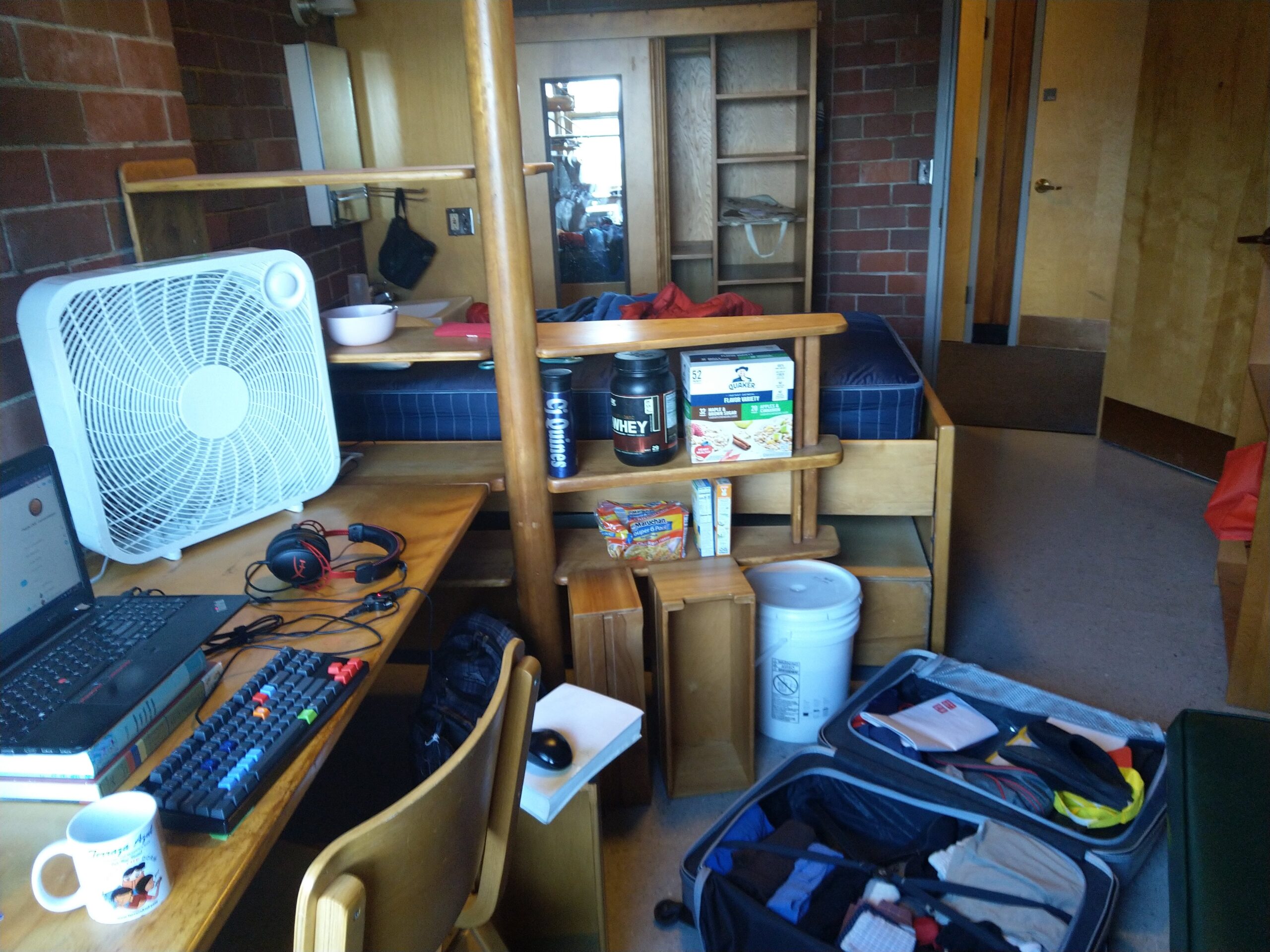 It took three trips to move all of my stuff, and I didn’t mind. It was a nice day. There was the mild inconvenience of my soap bottle bursting while inside my suitcase, and although my things were fine, it took an hour to clean it all off. But otherwise, the move was pretty fast.
It took three trips to move all of my stuff, and I didn’t mind. It was a nice day. There was the mild inconvenience of my soap bottle bursting while inside my suitcase, and although my things were fine, it took an hour to clean it all off. But otherwise, the move was pretty fast.
I specifically requested my old room, and I got it. Unpacking all of my stuff went pretty fast too, because I didn’t have a lot of stuff. The furniture’s not the same layout as it was when Jeffery and I left the room back in the spring. Instead, it looks like how it was when we first moved in last year. I decided to keep it that way.
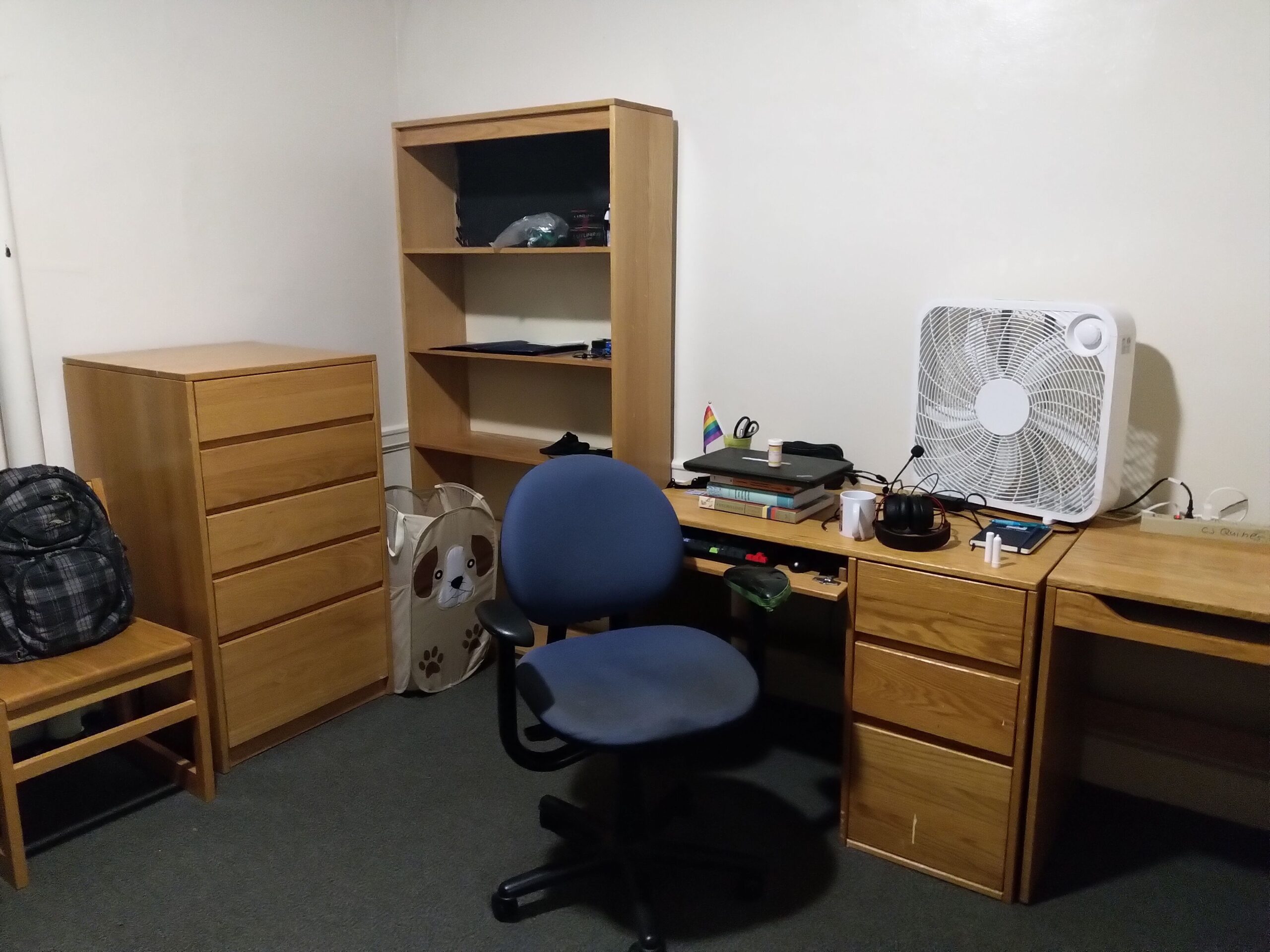 But it’s still the same room. It’s in the same place. It’s the same size. It has the cabinets that the previous people who lived here left behind. And it has the same chalkboard door.
But it’s still the same room. It’s in the same place. It’s the same size. It has the cabinets that the previous people who lived here left behind. And it has the same chalkboard door.
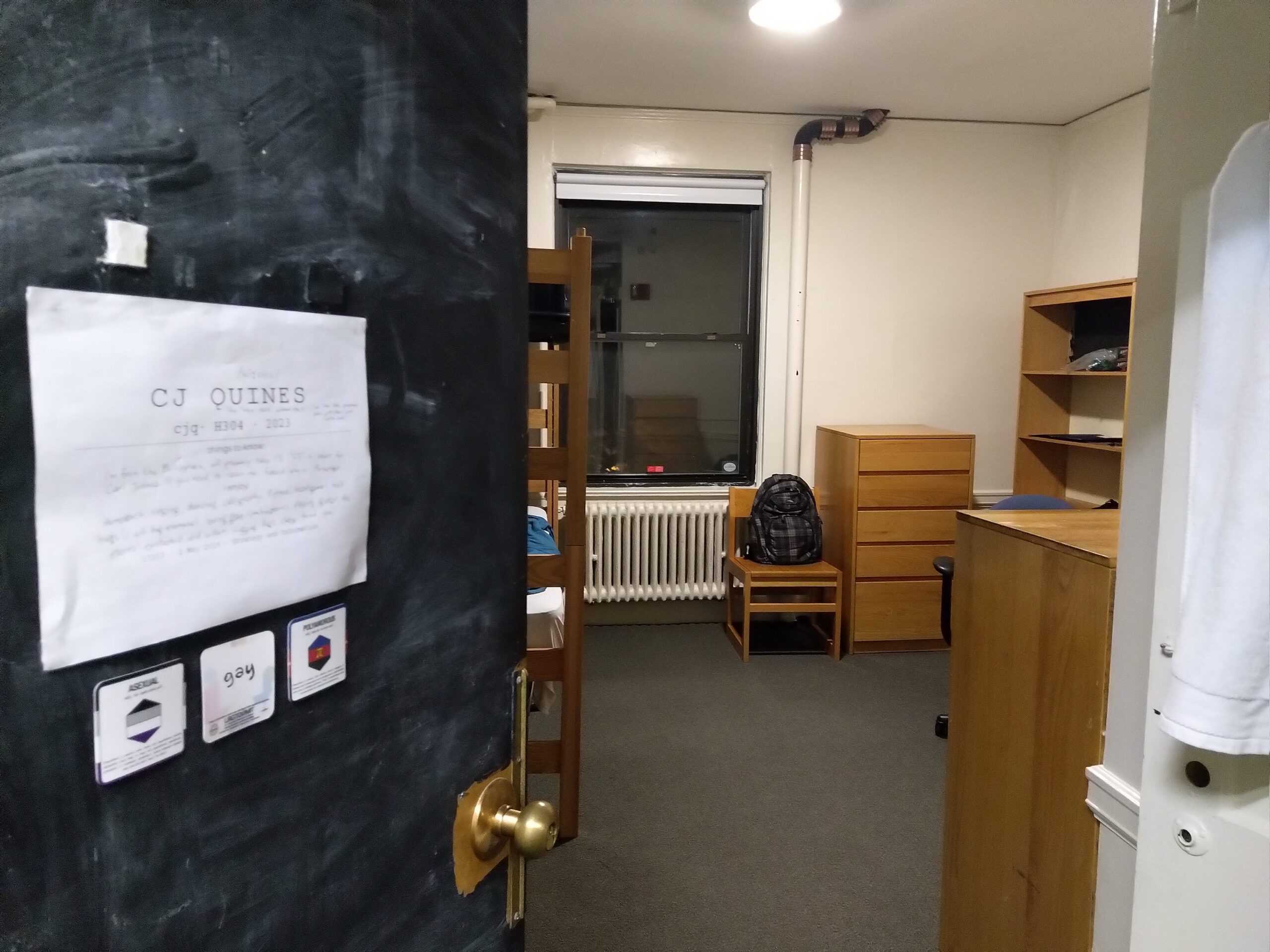 Seven. I walk out of the testing trailer, and start walking to Maseeh, to pick up lunch.
Seven. I walk out of the testing trailer, and start walking to Maseeh, to pick up lunch.
To get to Maseeh normally, I would swipe into Building 56, then walk indoors all the way to the end of the Infinite. But I couldn’t go into campus, so I had to take an outside route. It’s colder today, and it’s the first time I’ve worn a jacket in months, like a gentle reminder that summer is ending.
The dining hall is beginning to be a bit more normal. We didn’t have to choose between three set meals any more. Now, we could point at different things and ask for them again. I was feeling guilty about my food waste, so only asking for what I wanted to eat makes me feel a bit better.
As I pass by Killian Court on the way back, I stop. It’s a nice day, and the lawn was completely empty, so I decided to stay for a while. There’s this statue on the lawn, in front of Building 2, that has these layers of cylinders and slices of cylinders that you can sit on. So I sit on the statue, take out my lunch, take off my mask, and eat.
There I was, alone, eating my lunch, when it hit me. The last time I ate lunch on Killian Court was this week, the week before fall started, one year ago.
Eight. Is it just me, or are classes just not fun or fulfilling, in any sense of those words?
When people talk about their favorite classes, they always have high praise to stack on them. They love the lectures, or they really liked the psets, or they had this awesome recitation instructor. And it always feels like everyone is overhyping their classes. Even for the class I liked the most, 21W.022 Reading and Writing Autobiography, I felt nowhere near this much enthusiasm.
So maybe everyone is just overhyping, and secretly, our internal experiences are the same. Maybe this is similar to what I feel about romance or friendships, where the way it’s portrayed in media is just exaggerated, and the reality is just more dismal. It’s not as if we can compare internal experiences directly, right?
Or maybe my classes just sucked. Maybe none of my classes were good, and that one class that will change my mind about education forever is waiting for me sophomore year. After all, don’t people say that you don’t really get to take exciting classes in your first year?
But maybe, just maybe, maybe the reality is that I’ll never be interested in classes. Maybe I’m just not cut out for being a math major, maybe I’m not actually supposed to go into software engineering or web development. Maybe my heart is actually a writing major and I should drop everything and switch to 21W. Maybe I should just drop out of college, even.
Nine. Behold the cruelty of time: the day I moved into East Campus last year, and the day I moved into East Campus this year, is the third Friday of August.
One of my traditions, because I think it’s nice to have personal traditions, is to take a picture of my keys when I move out. Or at least, when I remember to take a picture. Here’s the picture when I moved out of Baker last Friday:
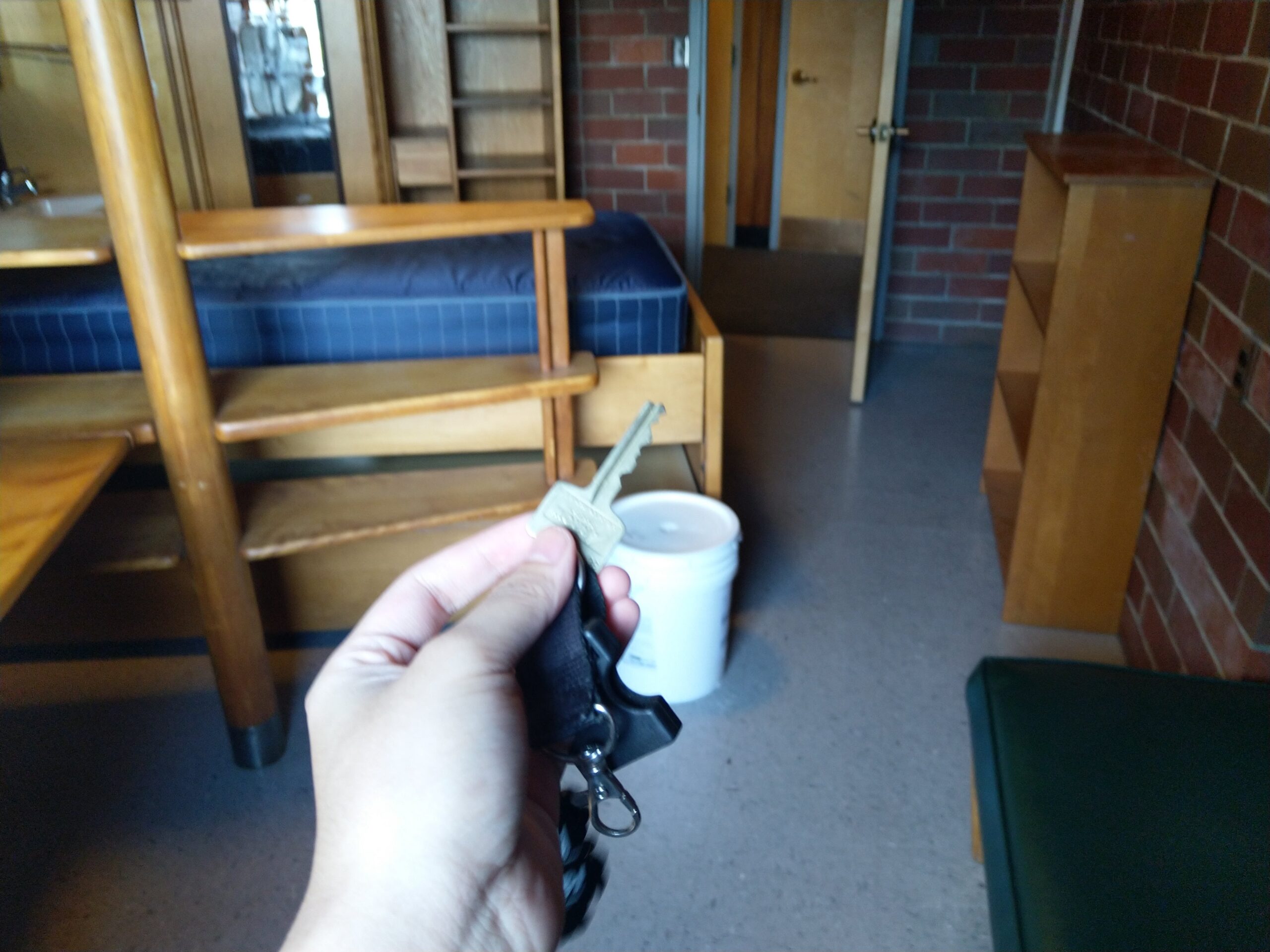 And here’s the picture when I moved out of East Campus last March:
And here’s the picture when I moved out of East Campus last March:
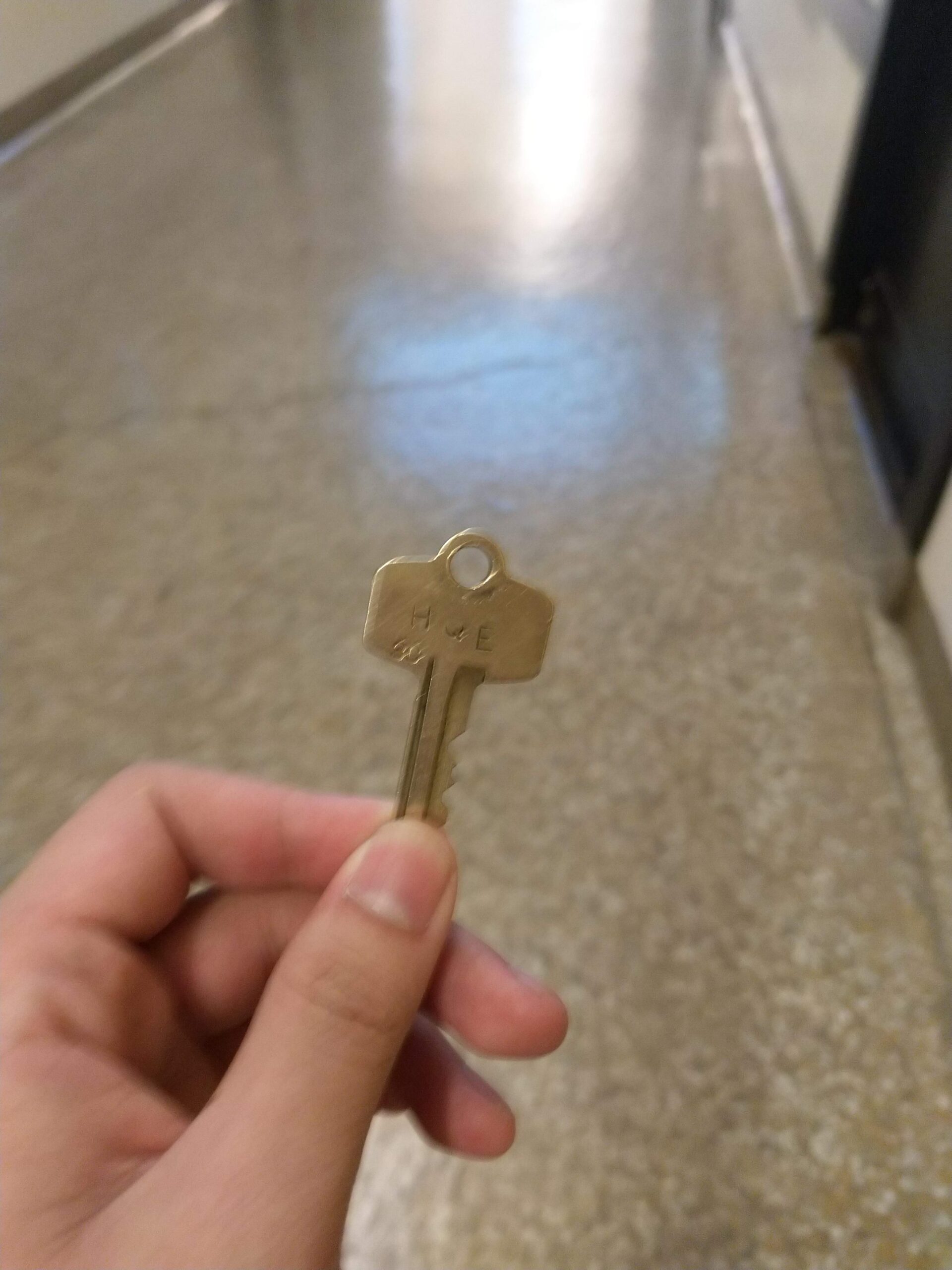 I don’t know why I started this, but I think it’s a nice way to remember I lived here, once. There’s something about a key that feels symbolic, as if it was inherently one of those things that carried more metaphorical weight than others. More like trees or flags than notebooks or scissors.
I don’t know why I started this, but I think it’s a nice way to remember I lived here, once. There’s something about a key that feels symbolic, as if it was inherently one of those things that carried more metaphorical weight than others. More like trees or flags than notebooks or scissors.
Ten. I was never a fan of new year’s resolutions. January just didn’t feel like the natural breakpoint between two years. Instead, it’s always felt like that time is around the end of August and the start of September, which is always a time that happens to line up with new beginnings.
There’s my birthday, of course. The end of PROMYS, which I went to for the past three years, is around this time. The last high school competition I ever joined happened around this time, two years ago, which was also around the time I started living alone again. And like I mentioned previously, it’s around this time I moved into East Campus last year, and around this time I’m moving back this year. So it’s a good time to reflect on a year of my life, before the next year starts.
Ostensibly, I’m in school to learn; as a full-time student, my job is to take classes and learn from them. But when I think about the things I’ve learned from the past year, everything academic just feels like background noise. I barely remember anything from my classes. I didn’t really enjoy my UROP. I don’t feel that drive to read about math, or CS, or whatever.
Instead, I feel like the things I’ve learned from the most, the things I’ve been drawn to the most, are everything outside my classes. I’ve learned a lot about academia and the industry and careers from talking to people. I can’t quite place it, but I’ve learned things like delegation or leadership, however cheesy it sounds, from my extracurriculars. I’ve learned the most programming and math from pursuing my personal projects, even.
And when I think about what classes I want to take this fall, I have a list of classes that I’m excited about, in theory, but I’m afraid that the moment I begin to take them, I’ll be unable to concentrate, or I’ll just lose interest, and doing classwork will feel like a slog. But maybe that’s just the depression.
Eleven. Since October 2017 I have not lived in a single place for more than nine months. I moved on October 2017, then January 2018, then March 2018, then June 2018, then August 2018, then September 2018, then June 2019, then August 2019, then March 2020, then August 2020. The amount of time I’ve lived in each place is three months, three months, three months, six weeks, one month, nine months, six weeks, six months, five months.
I’ve gotten used to moving quickly. I’ve gotten used to carrying only a few things, and leaving lots of things behind. Living from a suitcase has been my life, literally, throughout my gap year. Which is why, I guess, the move from Baker to East Campus the other week went by pretty quickly.
The other thing I’ve gotten used to is living alone. Up until the fall, I’ve never really had any roommates. For my gap year, I moved to a new city, away from many of my friends from high school, and I just got used to not having friends nearby. So when I had to be socially distant through the summer, interacting with everyone online, I was fine. And when MIT told us that we need to quarantine ourselves, and interact only with people in our pod for the next few months, it didn’t faze me.
I’ve gotten used to leaving places, leaving things, and leaving people.
Twelve. From Michael Lee’s Leaving:
There is no word for a journey comprised entirely of leaving. What left was there to do but go on driving east with everything I own?
I pass an endless field of sunflowers. A hundred-mile stretch of yard sales: an 88 cutlass, grandma’s jewelry, the hickory cabinet. God, if I could make money off this memory, I might just give you everything.
Thirteen. I am in Killian Court, eating lunch on the Great Lawn. It’s August 2019, during international student orientation. The past few days have been a time, exploring Cambridge and Boston with all these people I’ve just met.
And soon, REX will start, and in the East Campus courtyard this octagonal fort will rise. Burgers will be grilled and watered-down lemonade will be served. Soon, I’ll find myself using a hand drill for the first time. Tonight, I’ll be playing board games in Next with some of the other international students, and I’ll meet someone who’ll be my friend for the rest of the year.
Next week will be registration day, and I still don’t know what classes I’m going to take, but it’ll be fine. I’ll take the writing class that’ll be my favorite a year later, and I’ll take the algebra class where I’ll meet two of my best friends. And to think that I was worried, that I am so worried, about East Campus not being the right place for me, about whether I’ll be able to make friends in my classes, or whether I’ll enjoy my extracurriculars.
I’ll enjoy things, I’ll be happy. But I don’t know that yet. Right now, there are a million little things weighing on me, going into my first year of college, and part of me wishes that things will be fine, that I’m making choices that won’t irreparably fuck up my life, that I’ll end up doing things that’ll make me happy. And I wish I could talk to my future self, from one year later, and hear that from him. It’s unfortunate, I guess, that distance isn’t only space, but also time—
Fourteen. I am in Killian Court, eating lunch while sitting on the statue in front of Building 2. It is the week before classes start, and I still don’t know what classes I’m taking.
I’m worried that this semester won’t work out socially, that I won’t be able to keep in touch with my friends. I’m worried about resumes and the career fair and the summer. I’m worried about the spring and whether all the clubs I’m in will stay afloat.
And this fall, I think I’ll intentionally try to be excited about my classes. I’m lining up classes I’ve heard my friends say they’ve liked, trying to really choose things that feel exciting to me. And maybe I’ll end up finding joy, and changing my mind about things. Or maybe I won’t, and I could just spend the rest of my college life pouring myself into my extracurriculars, job prospects and education be damned.
Part of me wishes that no matter what I end up choosing, that everything will be okay. That I won’t regret the decisions I’ll make two, twelve, twenty years down the line, wish that I spent more time having fun, or wish that I spent more time caring about the production of capital. All I want is to get an email from myself a decade from now, telling me to keep doing what I’m doing, and that no matter what choice I make, I’ll be fine.
Fifteen. Ecclesiastes 1:9 NIV:
What has been will be again,
what has been done will be done again;
there is nothing new under the sun.
Sixteen. Things happen again, and again, and again. The same feelings and problems and worries. And I’ll take it. I’ll take it. If time wants to shove me in the same grooves, if it wants me to face the same problems, then that’s a good thing, because it means I’ll know how to solve it.
I’ve lived alone before, and I’m living alone now, and I’ll live alone again. It was fine, and it is fine, and it will be fine. I’ve had a million worries before and I have a million worries now, and it’ll be fine. I’ve pushed myself headfirst into paths not knowing where they’ll go, and I’m fine. I’m here, right now.
I have clawed my way upward from the valley of death, and I’ve been climbing ever since. The top of the mountain is out of sight, and that’s a good thing! Having more and more to climb is a good thing, because my life has been filled with good things! Nothing is new under the sun, and the same things will happen again, and again, and again, and this is a good thing—
Seventeen. That Wednesday night, I spend three hours talking to prefrosh.
We play Skribbl. I give people an impromptu tour of our empty hall. I head to the grills, and talk to prefrosh about East Campus, about housing, and meal plans, and cooking for yourself, and student government, and clubs, and the administration, and the people, the people, the people.
I tell people, tongue-in-cheek, that the great thing about REX or SCUFFY or whatever it’s called, is the upperclassmen getting to feed on the prefrosh’s energy. And it’s true, in some sense: I feel alive, and the world feels filled with color, just like it did around this time last year. But I like to imagine that the reason, the real reason it feels so good, is that MIT is about the people, and that’s what CPW or ESC or whatever it’s called is about.
It’s a celebration of the cool stuff that people do when they get together. It’s an invitation to talk to people who are into the same nerdy things you are, and to run events about whatever you’re interested in, no matter how weird it is. It’s an invitation to be yourself, no matter who you are. Because when we say you are welcome here, we want to mean every single word of it.
Eighteen. Behold the cruelty of time:
I am in Killian Court, eating lunch on the Great Lawn.
while sitting on the statue in front of Building 2.
It’s August 2019. Next week will be registration day,
and I still don’t know what classes I’m taking.
but it’ll be fine. And soon, REX will start,
and I talk to prefrosh about the people, the people, the people,
I’m worried about whether I’ll be able to make friends in my classes,
I’m worried I won’t be able to keep in touch with my friends,
about East Campus not being the right place for me,
about resumes and the career fair and the summer,
about whether I’ll enjoy my extracurriculars.
about whether all the clubs I’m in will stay afloat.
Part of me wishes that things will be fine,
that I won’t regret my decisions, twenty years down the line.
And I wish I could talk to my future self
and tell me to keep doing what I’m doing,
and hear from him:
no matter what choice I make, I’ll be fine.
Nineteen. I’m turning nineteen, and it’s terrifying.
But it’s fine. Things will be fine. Despite everything,
Twenty. I’m turning twenty, and it’s terrifying.
Despite everything, last year was a good year. Despite everything, things turned out fine.
And if it happened before, it’ll happen again.